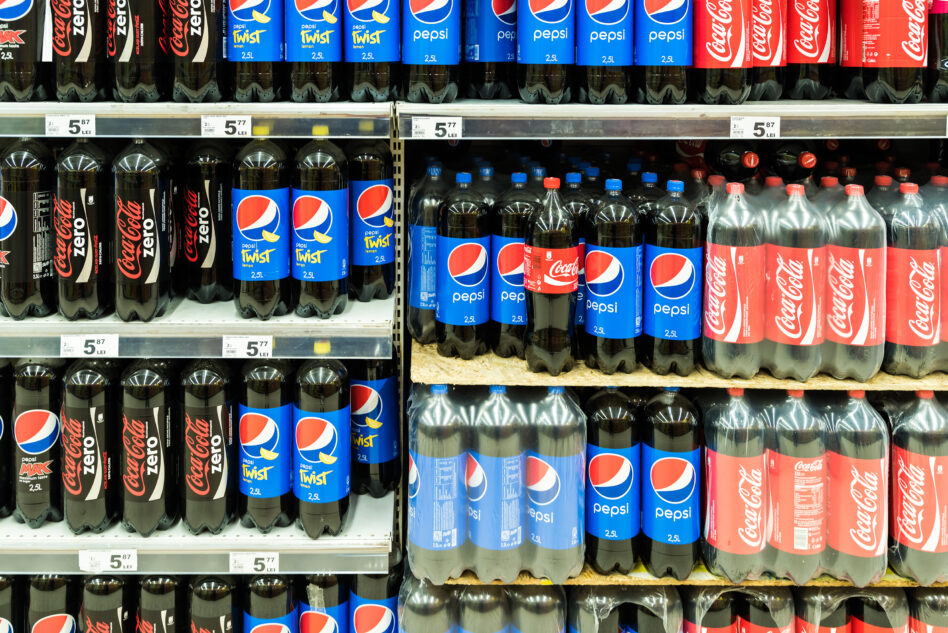
Image source: Radu Bercan / Shutterstock.com
PepsiCo and The Coca-Cola Company are under a preliminary investigation by the Federal Trade Commission over a recently revived 1930s law relating to wholesale pricing. The Robinson-Patman Act, also known as the anti-price discrimination act, was introduced in 1936 to introduce a level playing field for stores purchasing goods. The law was intended to prevent manufacturers from selling products to chain stores at lower prices than to small independent retailers.
Although the law is rarely enforced, FTC commissioner Alvaro Bedoya had indicated that the FTC would begin enforcing the antitrust law in a speech in September titled “Returning to Fairness”. The preliminary investigation has seen the FTC liaising with larger retailers gaining data to assess whether there is sufficient evidence of price discrimination. Walmart was one retailer that has been approached for information, although they are not being investigated.
The renewed focus on enforcing the RPA reflects wider patterns outlined in Bedoya’s September speech on addressing unfair business practices by large corporations. This has been a key focus of the Biden administration. This focus has seen the FTC tackle tech giants such as Apple and Google, an approach that has also been seen throughout Europe. This preliminary investigation represents one of the most high-profile applications of the RPA since its introduction in 1936.
An investigation against McCormick in 2000, which resulted in a settlement, was the most recent use of the law. Another high-profile case relating to the RPA occurred in 1994 when the American Bookseller’s Association filed a federal complaint alleging that several large publishers had violated the law. The drop in the use of the law has been linked to a shift in approach in the 21st century as policymakers began to focus on ensuring lower purchasing prices for the end consumers, rather than a previous focus on equal purchasing prices for all businesses.
This preliminary investigation of Coca-Cola and Pepsi by the FTC is seen by many as a test case. Former FTC commissioner Bill Kovacic discussed how test cases could help the FTC gain an operational understanding of long-dormant laws. Kovacic also discussed his tenure as FTC commissioner, stating that there were different priorities. A spokesperson for Coca-Cola described allegations of unlawful price discrimination as unfounded and noted an intention to defend any charges that may arise from the preliminary investigation.
Potential applications of the RPA also relate to the pharmaceutical sector, where the FTC has stated it could be enforced to ensure patients can access lower-priced pharmaceuticals. The law is controversial, though, with a previous FTC general counsel, Alden Abbott, stating that a return to enforcement of the RPA would have the unintended effect of increasing consumer prices. The progression of the FTC preliminary investigation against soft drink companies Coca-Cola and Pepsi will serve as a crucial test case for this once-dormant antitrust law.

Image source: Radu Bercan / Shutterstock.com
PepsiCo and The Coca-Cola Company are under a preliminary investigation by the Federal Trade Commission over a recently revived 1930s law relating to wholesale pricing. The Robinson-Patman Act, also known as the anti-price discrimination act, was introduced in 1936 to introduce a level playing field for stores purchasing goods. The law was intended to prevent manufacturers from selling products to chain stores at lower prices than to small independent retailers.
Although the law is rarely enforced, FTC commissioner Alvaro Bedoya had indicated that the FTC would begin enforcing the antitrust law in a speech in September titled “Returning to Fairness”. The preliminary investigation has seen the FTC liaising with larger retailers gaining data to assess whether there is sufficient evidence of price discrimination. Walmart was one retailer that has been approached for information, although they are not being investigated.
The renewed focus on enforcing the RPA reflects wider patterns outlined in Bedoya’s September speech on addressing unfair business practices by large corporations. This has been a key focus of the Biden administration. This focus has seen the FTC tackle tech giants such as Apple and Google, an approach that has also been seen throughout Europe. This preliminary investigation represents one of the most high-profile applications of the RPA since its introduction in 1936.
An investigation against McCormick in 2000, which resulted in a settlement, was the most recent use of the law. Another high-profile case relating to the RPA occurred in 1994 when the American Bookseller’s Association filed a federal complaint alleging that several large publishers had violated the law. The drop in the use of the law has been linked to a shift in approach in the 21st century as policymakers began to focus on ensuring lower purchasing prices for the end consumers, rather than a previous focus on equal purchasing prices for all businesses.
This preliminary investigation of Coca-Cola and Pepsi by the FTC is seen by many as a test case. Former FTC commissioner Bill Kovacic discussed how test cases could help the FTC gain an operational understanding of long-dormant laws. Kovacic also discussed his tenure as FTC commissioner, stating that there were different priorities. A spokesperson for Coca-Cola described allegations of unlawful price discrimination as unfounded and noted an intention to defend any charges that may arise from the preliminary investigation.
Potential applications of the RPA also relate to the pharmaceutical sector, where the FTC has stated it could be enforced to ensure patients can access lower-priced pharmaceuticals. The law is controversial, though, with a previous FTC general counsel, Alden Abbott, stating that a return to enforcement of the RPA would have the unintended effect of increasing consumer prices. The progression of the FTC preliminary investigation against soft drink companies Coca-Cola and Pepsi will serve as a crucial test case for this once-dormant antitrust law.



